A Guide to B2B Marketing Services
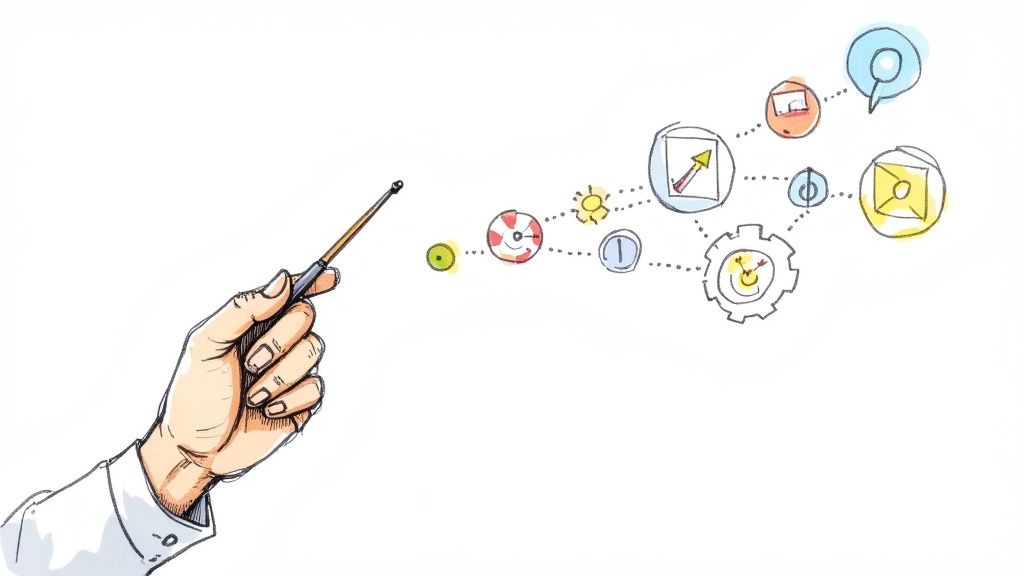
B2B marketing services aren't just about selling your product to another company. That’s B2C thinking in a B2B world. Instead, think of these services as the entire playbook for how you create and nurture valuable, long-term partnerships with other businesses. It's less about a single transaction and more about becoming an indispensable part of their success.
The True Purpose of B2B Marketing Services
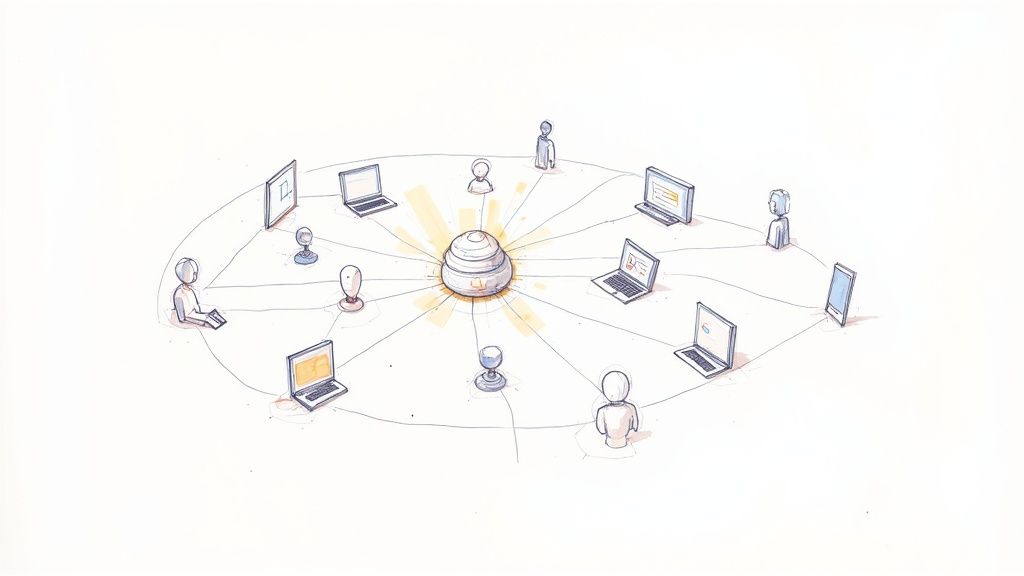
It’s tempting to view marketing as just another line item on a budget—an expense to be managed. But that perspective is stuck in the past. Today, effective B2B marketing services are about strategically positioning your company as a vital resource, building a foundation of trust that drives revenue for years, not just quarters.
Imagine your marketing strategy as an orchestra. Each service—SEO, content, account-based marketing—is a different instrument. A single violin can make a nice sound, but it's not going to fill a concert hall. It’s only when an expert conductor brings all the instruments together that you get a powerful performance that captivates the right audience. This coordinated approach is what turns marketing noise into memorable results.
Moving Beyond Transactions to Build Partnerships
The game has changed. The goal is no longer just to close a deal; it's to solve a client's problem and deliver undeniable value. The B2B companies winning today aren’t the ones shouting the loudest about their products. They're the ones educating their market, building communities, and becoming trusted advisors.
This shift toward relationship-building is exactly why the digital B2B space is exploding. The global B2B ecommerce market is on track to hit an incredible $20.9 trillion by 2027, growing at a blistering pace of 17.5% every year. That number tells a clear story: businesses are forging and relying on strong digital connections to make critical purchasing decisions.
Crafting a Foundation for Sustainable Growth
A smart marketing plan delivers far more than a list of leads. It builds a rock-solid foundation for sustainable growth by establishing your company as an authority in its field. It’s about creating a presence where potential clients see you not as just another vendor trying to sell them something, but as a crucial partner invested in their success.
Success in B2B is no longer about having the loudest megaphone. It's about having the most helpful voice in the room, consistently providing the answers your clients are searching for.
This approach demands a deep, genuine understanding of your audience and the skill to connect with them on their terms. By working with the right specialists, you can unlock that potential. To truly succeed, you need to understand the nuances of the field, which is why we put together a guide on what it takes to become a B2B marketing expert. That kind of collaboration ensures your marketing efforts don’t just get noticed—they resonate deeply and drive real business outcomes.
Exploring Core B2B Marketing Service Categories
It's easy to get lost in the sea of B2B marketing services and see them as just a long list of tasks. But that's the wrong way to look at it. A much smarter approach is to think of them as specialized toolkits, each designed to solve a specific business problem. Just like a master carpenter has different tools for framing, finishing, and detail work, a savvy B2B leader knows which marketing service to deploy for the right outcome.
These services aren't meant to work in isolation. They're interconnected systems that build on each other to create momentum. We can break them down into three core categories, each one representing a critical stage in building a powerful B2B growth engine.
Building Your Digital Authority
Before you can even think about selling, you have to earn the right to be heard. This first group of services is all about laying the groundwork—establishing a credible, trustworthy, and authoritative digital presence. It's the foundation for everything else you'll do.
Think of your website as your digital headquarters. If it’s confusing, slow, or buried on page ten of Google, potential clients will just move on. This is where web development and search engine optimization (SEO) become absolutely non-negotiable.
Search Engine Optimization (SEO): This is the art and science of showing up when potential clients are actively searching for the solutions you offer. It goes way beyond just stuffing keywords onto a page; it’s about signaling to search engines that you are a relevant, authoritative answer to a buyer's question. A solid SEO strategy makes sure you're there in those critical moments of need.
Website Development and Design: Your website is often the very first handshake a prospect has with your brand. Professional B2B web development is focused on creating a seamless user experience that guides visitors to valuable information, builds their confidence, and makes it incredibly easy for them to take the next step. It solves the deadly problem of a bad first impression.
This infographic really drives home how services like Content Marketing, Account-Based Marketing, and Email Automation are not just separate tactics, but interlocking pieces of a cohesive B2B marketing strategy.
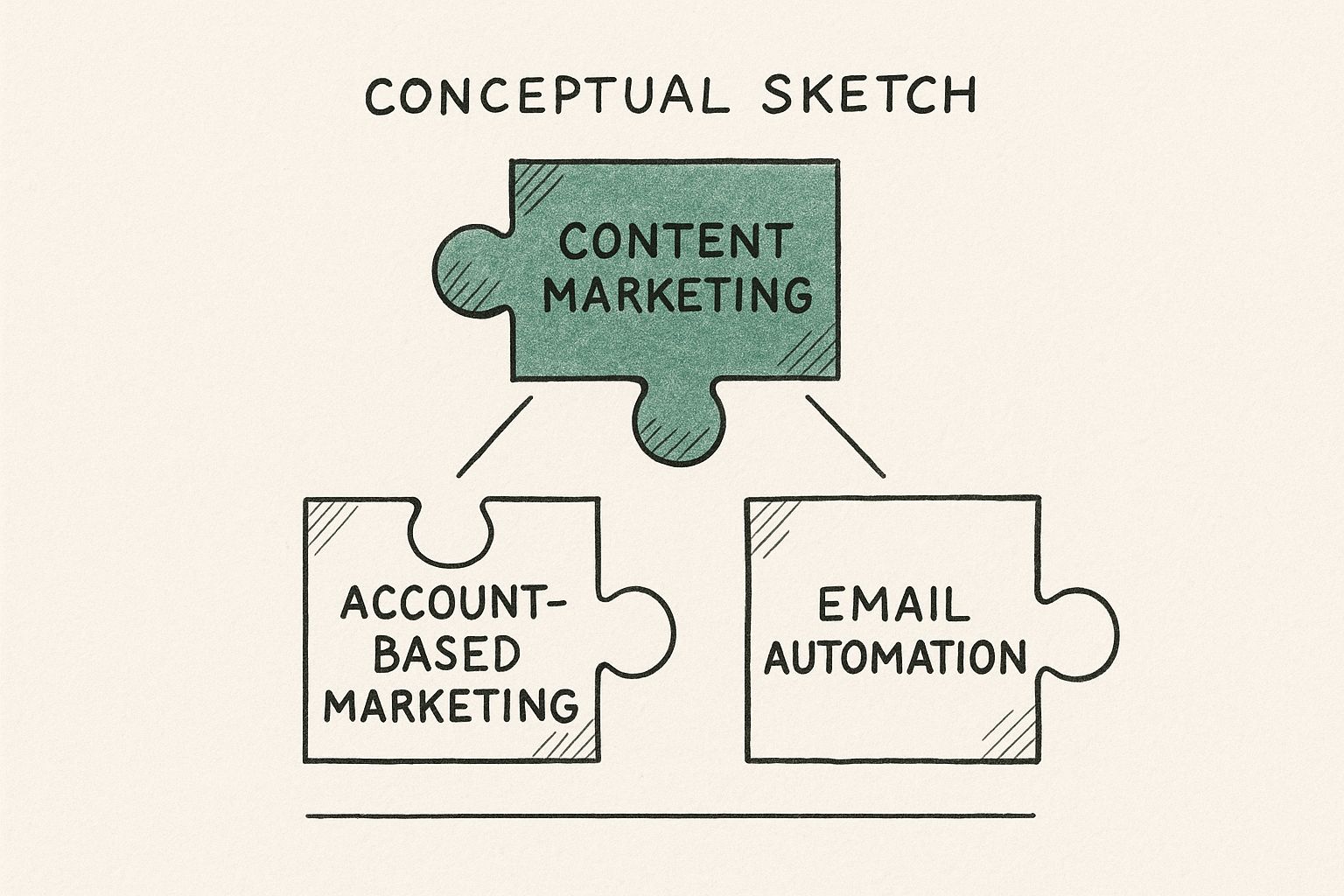
The real magic happens when you integrate these disciplines. You create a system where each part makes the others stronger.
Amplifying Your Message
Once your digital foundation is solid, the next challenge is to get your expertise out there and connect with your target audience in a meaningful way. This category of services is all about creating and distributing valuable information that attracts, engages, and educates potential buyers.
This is the shift from just being findable to being indispensable. It's how you become a trusted voice in your industry.
Your message isn't just what you say about your product; it's the value you deliver before you ever ask for a sale. True amplification comes from generosity of knowledge.
Content marketing and public relations (PR) are the two main engines here. They work hand-in-hand to build your reputation and get your message to the right people through the right channels.
Content Marketing: This involves creating and sharing articles, whitepapers, case studies, webinars, and other materials that directly address your audience's biggest pain points. With over 70% of B2B decision-makers now preferring to do their own research, high-quality content is absolutely essential for influencing their journey. It proves your expertise and overcomes buyer skepticism.
Public Relations (PR): B2B PR is focused on securing earned media coverage in industry publications, landing speaking opportunities, and managing your company's reputation. It provides that powerful third-party validation that is often far more convincing than any ad you could run yourself.
Understanding the different places where you can amplify your message is key. For a deeper dive, check out our guide on the most effective marketing channels for B2B, which breaks down how to pick the best avenues for your specific goals.
Driving Measurable Growth
With a strong foundation and an amplified message, the final step is to turn all that authority and attention into tangible business results. This category of B2B marketing services is laser-focused on generating qualified leads, nurturing relationships with high-value accounts, and directly contributing to revenue.
This is where marketing’s impact shows up clearly on the balance sheet. It’s all about creating predictable, scalable pipelines for your sales team.
Account-Based Marketing (ABM) and targeted lead generation campaigns are the workhorses of this category.
Lead Generation: This covers a range of tactics—from paid advertising (PPC) and email marketing to social media campaigns—all designed to capture contact information from interested prospects. Modern B2B lead gen is about quality over quantity, using data to find and attract buyers who have a genuine need for what you sell.
Account-Based Marketing (ABM): Instead of casting a wide net, ABM is like marketing with a spear. It's a highly focused strategy where marketing and sales teams join forces to go after a specific list of high-value "dream" accounts. All the messaging and outreach are personalized for that specific company, making it a powerful way to land bigger, more complex deals.
These services solve the ultimate business problem: a lack of qualified opportunities in the sales pipeline. They provide the fuel that sales teams need to hit their targets and drive the business forward. To see how these services come together in practice, you might want to get insights from a dedicated B2B Marketing Agency.
Ultimately, by strategically combining services from these three core categories—building authority, amplifying your message, and driving growth—you can construct a comprehensive marketing system that delivers consistent and measurable results.
To help you visualize how these categories differ, here’s a quick comparison of their goals, activities, and success metrics.
Comparing Key B2B Marketing Service Categories
This table should make it clear that while each category has a distinct focus, they all work toward the same ultimate goal: sustainable business growth.
The Unstoppable Rise of B2B Content Marketing
In the B2B world, trust isn’t something you can ask for—it has to be earned. Long gone are the days when a slick sales pitch was enough to land a high-value contract. Today's decision-makers are researchers. They arm themselves with information and vet potential solutions long before they ever agree to take a meeting.
This is exactly where content marketing comes in. It's not just another tactic; it's the central pillar of modern B2B marketing services.
Think of content marketing as the practice of solving your customer's problems before they're even your customer. Instead of interrupting their day with an ad, you become the resource they actively seek out for answers. You create and share valuable, relevant, and consistent information that attracts and retains a very specific audience.
This simple shift changes the entire dynamic. You stop being a seller and become an expert guide. A company looking for new accounting software doesn't start by Googling brand names. They search for things like "how to streamline expense reporting" or "best practices for financial compliance." The company that provides the most helpful answer—in an article, a webinar, or a guide—is the one that earns their trust first.
Why Content Is the Engine of B2B Success
The B2B buying journey is almost never a straight line. It’s a complex, winding road involving multiple stakeholders, deep research, and long consideration periods. Content marketing is perfectly built to navigate this complexity because you can tailor different formats to each stage of that journey.
Awareness Stage: Right at the beginning, potential customers are just starting to identify a problem. Your job here is to educate, not to sell. Things like blog posts, research reports, and eBooks that speak to their high-level challenges are perfect for grabbing their attention and introducing your brand as a helpful authority.
Consideration Stage: Once they’ve put a name to their problem, they start looking for solutions. This is where more in-depth content really shines. Webinars, detailed case studies, and comparison guides help them evaluate their options and see exactly how you measure up.
Decision Stage: Finally, when they're ready to pick a partner, they need validation. This is the time for customer testimonials, product demos, and free trials that provide the final proof they need to make a confident choice.
Aligning your content this way is why it has become a non-negotiable part of B2B marketing. Statistics from SEOPROFY show that by 2025, an overwhelming 91% of marketers are using content to engage B2B audiences. It’s simply how business gets done.
The Future of Content Creation with AI
The demand for high-quality content can feel immense, but new tools are making it easier for teams to meet the challenge. Artificial intelligence is rapidly changing how content gets produced, helping marketing teams scale their efforts without watering down the quality.
AI isn’t here to replace the strategist or the expert. It’s here to amplify them, turning great ideas into impactful content faster than ever before. It’s a tool for scaling thought leadership, not automating it.
Modern AI tools can help with brainstorming topics, generating outlines, summarizing dense research, and even drafting initial versions of articles or social media posts. This frees up human experts to focus on what they do best: providing unique insights, deep analysis, and a compelling brand voice. The result is a much more efficient and powerful content engine.
Right now, approximately 36% of marketers are already using AI for content creation tasks. This lets them produce more targeted content, connect with more customers, and maintain a consistent, valuable presence.
For a comprehensive look at building a strategy around this, our guide to content marketing in B2B offers actionable steps. By combining human expertise with AI efficiency, businesses can create a content program that not only builds trust but also becomes an unstoppable driver of growth.
How to Choose the Right B2B Marketing Partner

Picking a B2B marketing partner is one of those make-or-break decisions for a founder or executive. It’s not just about offloading a few tasks; it's about handing over the keys to a critical part of your company's future.
A great partnership can be the jet fuel for your growth. The wrong one? It becomes a slow, painful drain on your resources, your time, and even your team's morale.
This decision demands more than just being wowed by a slick sales pitch or a glossy portfolio. You need a clear-headed, methodical approach. You’re not just hiring a vendor—you’re searching for a genuine extension of your team.
Look For Proof, Not Promises
Anyone can talk a good game. The real gut check is what they’ve actually delivered for businesses like yours. When you start evaluating providers of B2B marketing services, your first job is to become a skeptic and scrutinize their track record.
Don't let them get away with vague claims like "we increased traffic." That means nothing. You need to dig for tangible proof that they moved the needle on business goals. A partner worth their salt will be an open book about their past performance and eager to show you how they measure real success.
Ask for detailed case studies that lay out the whole story: the client's challenge, the specific strategies they rolled out, and the hard numbers that prove it worked.
Key Question: "Can you walk me through a campaign for a client similar to us? I want to see everything from the initial goals to the final results—give me the real metrics, like MQLs generated, pipeline value added, or their final customer acquisition cost."
Red Flag: If they get cagey about sharing specific data or try to impress you with vanity metrics like social media likes, it’s a big warning sign. It often means they lack proof of genuine business impact.
This step alone will help you filter out the agencies that just look good on paper from the ones that actually know how to drive growth.
Assess Their Industry and Niche Expertise
B2B isn’t a single, massive market. It’s a thousand tiny, distinct worlds. The marketing playbook for a cybersecurity firm is completely different from one for a manufacturing software company. Finding a partner with deep, firsthand experience in your specific industry is a massive advantage.
Why? Because they already get it. They understand your buyers' unique headaches, they speak their language, and they know which channels they actually pay attention to.
This specialized knowledge saves you an incredible amount of time and money. An agency that already knows your world doesn't need three months of onboarding just to learn the basics. They can start adding value from day one because they’ve already got a feel for your audience, your rivals, and the market dynamics at play.
Your marketing partner should not be learning your industry on your dime. They should be bringing insights and expertise that you don't currently have in-house.
Look for hard evidence of their niche focus. Check out their client list, read their blog content, and pay close attention to the language they use. If they claim to be experts in everything, they're probably masters of nothing.
Evaluate Communication and Reporting Processes
Even the most brilliant strategy on earth will crash and burn without clear, consistent communication. Before you even think about signing a contract, you need to get crystal clear on exactly how you’ll work together day-to-day.
Misaligned expectations around communication are one of the top reasons these partnerships fail. Nail down the cadence and format for meetings, updates, and performance reports right from the start. A truly professional partner will already have a well-oiled process for keeping you looped in.
- Weekly Check-ins: Will you have a standing meeting to review progress and make quick adjustments?
- Reporting Dashboards: Do they give you access to a live dashboard where you can see the key metrics anytime you want?
- Monthly Reviews: Is there a formal, strategic review each month to measure performance against goals and plan for the next 30 days?
This isn’t about micromanagement. It's about building a transparent, collaborative rhythm. The right partner will welcome this structure because it keeps everyone aligned and laser-focused on the same goals. For leaders needing that high-level guidance, understanding the comprehensive role of a Fractional CMO in B2B companies can offer a great model for what strong strategic leadership and reporting should look like.
Ensure a Strong Cultural Fit
Finally, don't ever underestimate the power of a good cultural fit. This isn't a faceless transaction; you're going to be working closely with these people. A clash in values or working styles will create constant friction that undermines the whole project.
Are they proactive problem-solvers who take initiative, or do they just sit back and wait for instructions? Do they challenge your ideas with constructive feedback, or do they just nod and agree with everything you say?
The ideal partner operates with a powerful sense of ownership, treating your business with the same care as if it were their own. They're curious, they're dedicated, and they are genuinely invested in seeing you win. Finding that fit is absolutely crucial for building a productive, long-term relationship. For a deeper dive, our guide on choosing the right agency for B2B marketing offers even more valuable insights.
Integrating Brand and Demand Marketing
Great marketing isn't about running isolated campaigns; it's about building a unified, powerful engine for growth. This is where the real strategic magic happens—in the seamless fusion of long-term brand building with the immediate, gritty work of demand generation.
Trying to succeed with just one is like trying to row a boat with a single oar. You'll just go in circles.
Think of it like this: brand marketing is the slow, deliberate work of planting an entire orchard. You're investing in the soil, the trees, and the overall health of the ecosystem for years to come. It’s a long-term play for growth and reputation.
Demand marketing, on the other hand, is harvesting the fruit each season. It’s immediate, measurable, and absolutely essential for keeping the business running right now. An orchard that’s never harvested provides no immediate value, but a harvest from a non-existent orchard is just a one-time score. You need both to build something that lasts.
Unifying Long-Term Vision with Immediate Needs
The most effective B2B marketing services are built on the understanding that these two functions have to work in tandem. A campaign should never be just for brand awareness or just for lead generation. The best initiatives do both at the same time, building your reputation while methodically filling your sales pipeline.
This integrated mindset is what finally shifts marketing from a cost center to a predictable growth engine. It’s about creating assets that build your brand’s authority and then designing clear pathways for that authority to convert into real, tangible business opportunities.
The ultimate goal is to create a marketing function where your brand's strength makes demand generation easier, and your demand generation activities reinforce the credibility of your brand.
This connection creates a powerful feedback loop. When prospects already trust and respect your company, a strong brand dramatically lowers customer acquisition costs and shortens those painfully long sales cycles.
Practical Examples of Integrated Campaigns
So, what does this actually look like in the real world? It's about designing every marketing activity to serve this dual purpose.
Here are a few classic examples:
- A Thought-Leadership Webinar: You bring in an industry expert to host a webinar on a critical challenge your audience faces. This immediately positions you as a knowledgeable leader, building your brand. At the same time, the registration form is capturing high-intent leads for your sales team to follow up on.
- A Data-Rich Industry Report: Your team invests in original research and publishes a comprehensive report packed with unique insights. This becomes a cornerstone asset that journalists and other companies cite (brand building), while also serving as a gated download that generates a steady stream of qualified leads (demand generation).
This balanced approach is finally starting to catch on. While research shows nearly 59% of B2B marketers still dedicate at least half their budget to immediate lead generation, about 40% are planning to increase their spending on brand-building activities. The data shows a growing recognition that you simply can't neglect one for the other.
Achieving this balance is the hallmark of a mature marketing organization. By weaving brand and demand together, you create a resilient strategy that delivers results today while building the foundation for a stronger, more profitable tomorrow. For a deeper dive into this philosophy, our article on modern B2B branding strategies is a great place to start.
A Few Common Questions About B2B Marketing Services
Diving into the world of B2B marketing services can feel a lot like learning a new language. You know it’s powerful, but figuring out the first few steps can be tricky. To help clear things up, I've pulled together some of the most common questions I hear from business leaders just starting out.
Think of this as your quick-start guide. No jargon, just straight answers to help you make smarter decisions for your company’s growth.
How Long Does It Take to See Results?
This is always the first question, and the honest-to-goodness answer is: it really depends on the strategy you're running. Not all marketing plays are designed to score points at the same speed.
Imagine you're trying to get a fire going. Paid advertising, like pay-per-click (PPC) campaigns, is like using a lighter. It’s fast, direct, and you can generate leads and test your messaging in a matter of weeks. You get immediate heat.
On the flip side, organic strategies like SEO and content marketing are more like building that fire from scratch with kindling and logs. It's a long-term investment that takes patience, but once it’s going, you’ve built a valuable asset that will generate warmth consistently over time. You might see the first sparks in 3-6 months, but a self-sustaining, roaring fire typically takes 6-12 months to build.
The trick is to watch both the scoreboard and the playbook. Keep an eye on immediate signals like website traffic and content engagement, because those are the early indicators of future qualified leads and a healthier customer acquisition cost down the line.
What Is the Main Difference Between B2B and B2C Marketing?
At its core, the biggest difference comes down to who you're talking to and why they're buying. It’s the difference between a calculated business investment and a personal, often emotional, purchase.
B2B marketing is all about business-to-business. The buying process here is highly rational, almost always driven by return on investment (ROI), and usually involves a whole committee of decision-makers from different departments. A single B2B sales cycle can stretch on for months, so success hinges on building trust and demonstrating deep expertise through educational content and genuine relationship-building.
B2C marketing, on the other hand, targets individual consumers. These buying decisions are often emotional, sometimes impulsive, and usually made by one person in a flash. B2C success often comes down to creating a strong brand identity, forging an emotional connection, and driving broad awareness through mass-market channels.
Can Small Businesses Benefit from B2B Marketing Services?
Absolutely. In fact, for a small business, smart B2B marketing isn't just a nice-to-have—it's the ultimate equalizer. It’s the slingshot that lets a smaller company compete effectively with a larger one.
The biggest mistake small businesses make is trying to do everything at once. A winning strategy doesn't require a massive budget; it requires intense focus. Instead of trying to be everywhere, a small business can use B2B marketing services to completely own a specific niche.
Here’s how a smaller company can punch way above its weight class:
- Targeted Content Marketing: By creating incredibly specific content, a small firm can quickly become the go-to expert in its narrow field, attracting high-quality leads that come to them.
- Local SEO Dominance: For businesses serving a specific geographic area, a focused local SEO strategy can make them the obvious first choice for any local company searching for their services.
- Hyper-Personalized Outreach: Without thousands of leads to juggle, a small team can pour its energy into building real, authentic relationships with a handful of high-value prospects.
The secret is finding a marketing partner who knows how to build a lean, focused plan. This ensures every dollar you spend is tied directly to a result you can measure, empowering your small business to achieve incredible growth without needing a giant's budget.
Ready to build a B2B marketing strategy that drives real adoption and revenue? At Big Moves Marketing, I specialize in helping B2B SaaS and AI startups launch new products with the positioning, sales tools, and strategies that win deals. Let's create your path to market success together. Learn more about my fractional CMO and product marketing services.
%20png%20copy.png)

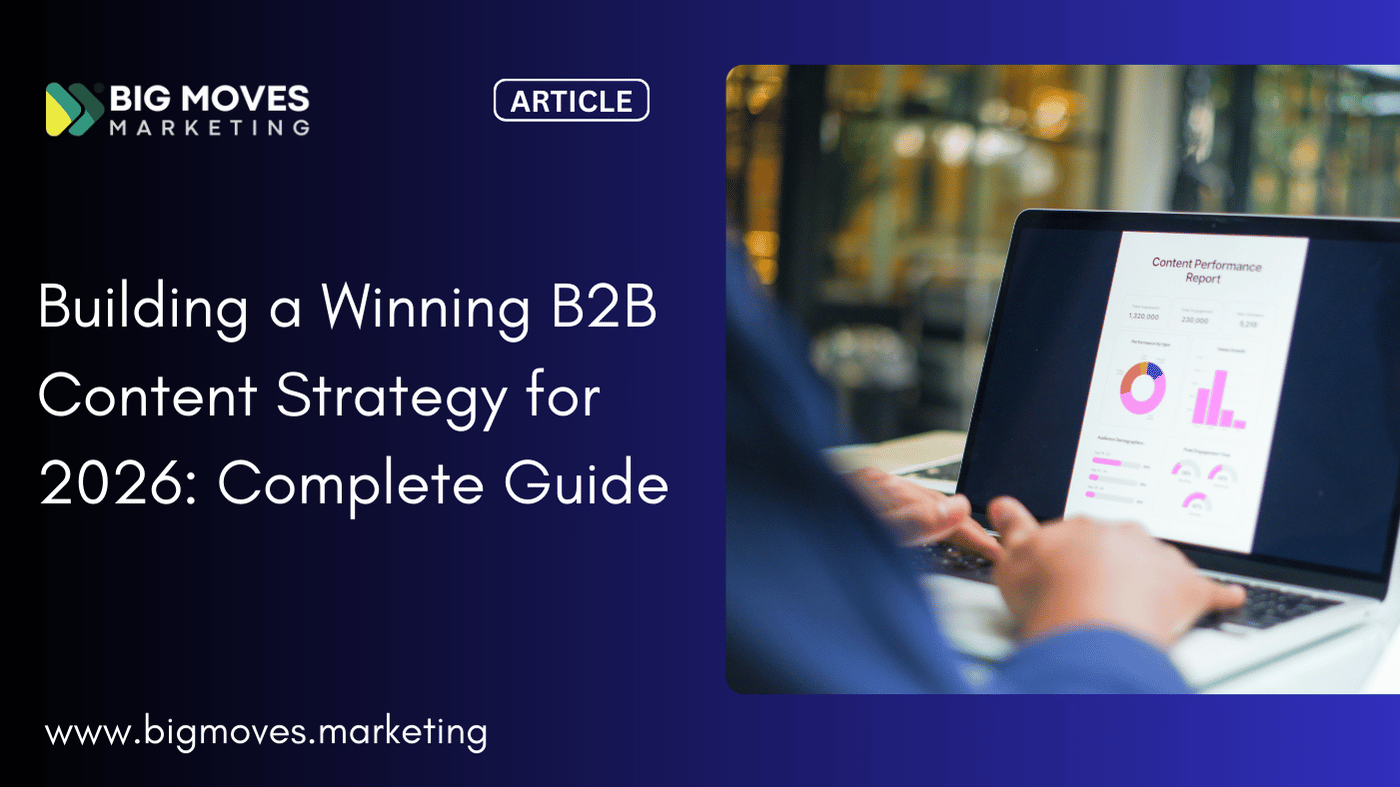

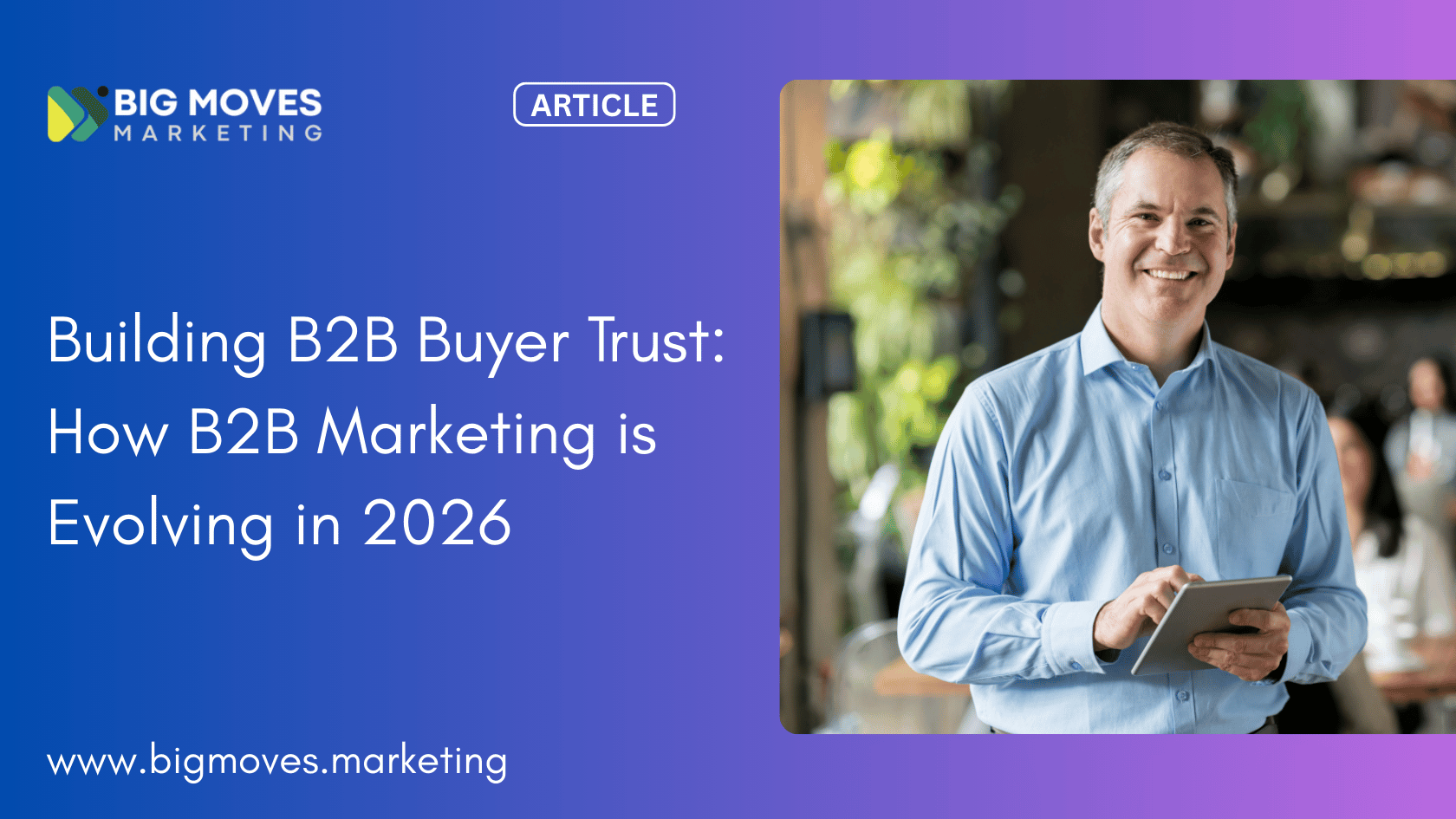


%20-%20white.svg)
